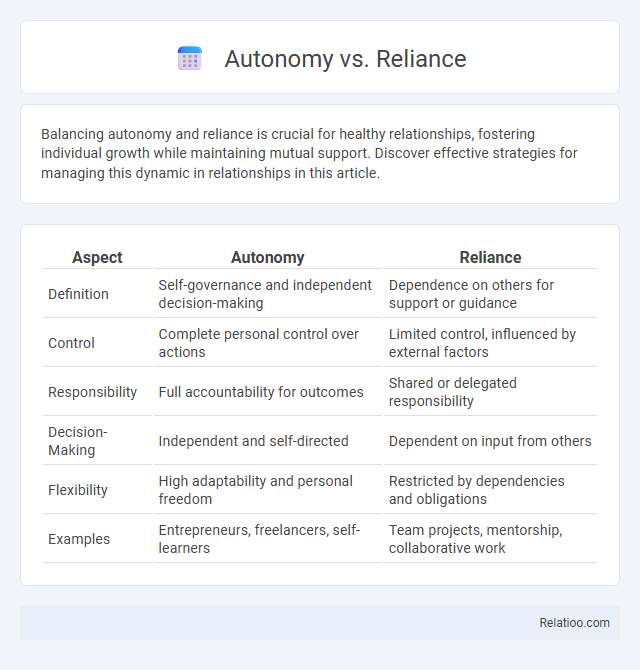Balancing autonomy and reliance is crucial for healthy relationships, fostering individual growth while maintaining mutual support. Discover effective strategies for managing this dynamic in relationships in this article.
Table of Comparison
| Aspect | Autonomy | Reliance |
|---|---|---|
| Definition | Self-governance and independent decision-making | Dependence on others for support or guidance |
| Control | Complete personal control over actions | Limited control, influenced by external factors |
| Responsibility | Full accountability for outcomes | Shared or delegated responsibility |
| Decision-Making | Independent and self-directed | Dependent on input from others |
| Flexibility | High adaptability and personal freedom | Restricted by dependencies and obligations |
| Examples | Entrepreneurs, freelancers, self-learners | Team projects, mentorship, collaborative work |
Defining Autonomy and Reliance
Autonomy refers to an individual's capacity for independent decision-making and self-governance, emphasizing personal freedom and control over one's actions. Reliance denotes the degree to which individuals depend on others for support, guidance, or resources, highlighting interdependence within social or organizational contexts. Understanding the balance between autonomy and reliance is crucial for fostering effective self-expression and personal development.
Historical Perspectives on Autonomy vs Reliance
Historical perspectives on autonomy versus reliance reveal shifting societal values influenced by economic, political, and cultural developments. In pre-industrial societies, reliance on extended family and community networks was essential for survival, whereas the Enlightenment era emphasized individual autonomy linked to personal freedom and rational self-governance. Modern industrialization and globalization have further complicated these dynamics, fostering a blend of autonomous decision-making accompanied by interdependent social and economic relationships.
Key Differences Between Autonomy and Reliance
Autonomy involves independent decision-making and self-direction, whereas reliance emphasizes dependence on others for support and guidance. Autonomy fosters personal responsibility and self-regulation, while reliance often requires collaboration and trust in external assistance. These core differences highlight how autonomy cultivates individual empowerment, contrasting with reliance's foundation in interdependence.
Psychological Impacts of Autonomy
Autonomy significantly enhances psychological well-being by fostering a sense of control and competence, which reduces stress and anxiety levels. When you experience greater autonomy, intrinsic motivation and self-efficacy improve, promoting mental resilience and personal growth. This psychological impact contrasts with reliance, which can undermine self-confidence, and self-expression, which supports identity but depends on autonomous choices to be truly fulfilling.
The Role of Reliance in Human Relationships
Reliance plays a crucial role in human relationships by fostering trust, cooperation, and emotional support, enabling individuals to navigate challenges collectively. It balances autonomy and self-expression by creating a secure environment where people can express themselves freely while depending on others for guidance and assistance. Healthy reliance strengthens social bonds and promotes resilience, enhancing overall well-being and interpersonal connection.
Cultural Influences on Autonomy and Reliance
Cultural influences significantly shape autonomy and reliance, with collectivist societies emphasizing interdependence and communal decision-making, promoting reliance on family and social networks. In contrast, individualistic cultures encourage personal autonomy, valuing self-expression and independent choices as markers of identity. Your understanding of these cultural frameworks can help navigate social expectations and enhance interpersonal relationships across diverse environments.
Balancing Autonomy and Reliance in Everyday Life
Balancing autonomy and reliance involves recognizing the value of independence while also embracing support systems that enhance personal growth and decision-making. Effective balance is achieved by cultivating self-awareness to identify when to assert individual preferences and when to seek collaboration or assistance from others. Integrating autonomy with strategic reliance fosters resilience and adaptability in everyday life challenges.
Autonomy vs Reliance in the Workplace
Autonomy in the workplace fosters innovation, motivation, and job satisfaction by allowing employees to make independent decisions and take ownership of their tasks. Overreliance on management or colleagues can stifle creativity and reduce productivity, hindering organizational growth. Your ability to balance autonomy with necessary support can significantly enhance team performance and personal development.
Challenges and Risks of Extreme Autonomy or Reliance
Extreme autonomy can lead to isolation and difficulty seeking support, increasing stress and impairing decision-making. Excessive reliance on others risks dependency, reducing personal growth and resilience. Balancing your self-expression while navigating autonomy and reliance is critical to avoid these pitfalls and maintain emotional well-being.
Strategies for Achieving Healthy Autonomy-Reliance Balance
Establishing clear boundaries and open communication channels fosters a healthy autonomy-reliance balance by encouraging mutual respect while enabling individual self-expression. Implementing collaborative decision-making strategies promotes shared responsibility, reducing overdependence and empowering personal initiative. Regular reflection on emotional needs and interdependence dynamics enhances adaptive adjustments, supporting both independence and connectedness in relationships.

Infographic: Autonomy vs Reliance
 relatioo.com
relatioo.com